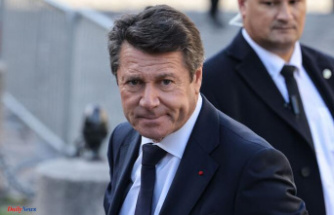Robert Habeck wanted to finally end the debate about a nuclear power plant lifetime extension. With his dishonest approach, however, he achieves the opposite. But even nuclear power advocates are dishonest when they claim that the three old nuclear power plants would help Germany in times of need.
That was a really big show from the Federal Minister for Economic Affairs and Climate Protection. On Monday evening Robert Habeck had the four heads of the transmission system operators appear as experts in front of the capital's press to present the results of the energy security stress test commissioned by his ministry. And what the experts said was somewhat reassuring.
According to the report, Germany will not have any electricity problems in the coming winter, because enough electricity will be produced even without Russian gas and, in an emergency, electricity can be imported from abroad - just as France is currently compensating for its many nuclear power plant failures with electricity imports from Germany. Habeck has nevertheless failed in his actual goal of ending the debate about extending the lifetime of nuclear power plants once and for all. And he's partly to blame for that.
Because the fact that the Greens linked the experts' presentation with his decision to leave two nuclear power plants in the emergency reserve until mid-April, but then to finally end the issue of nuclear power in Germany, is unfair. Habeck clearly aimed to give the impression that the network operators supported his decision with all their expertise. But firstly, this is not their job at all, secondly, they did not position themselves on Habeck's decision and thirdly, in their stress test results, they certainly made arguments appear that could speak in favor of extended stretching operations or even an extension of the running time.
The report comes to the conclusion that the continued operation of the three remaining nuclear power plants, which should have ceased operations at the turn of the year, could very well help in times of crisis. Namely, when an extremely large amount of electricity is requested in Germany, not enough is produced in the country and foreign electricity producers cannot help out because of their own problems. A lot would have to come together, but Habeck himself asserted: "We have to expect the worst." So if such a scenario occurs, the higher basic utilization of the German grid due to the continued operation of the nuclear power plant could mean that in the calculated emergency only 4.6 instead of 5.1 gigawatts of electricity are missing to cover the underlying demand.
The network operators make a number of other recommendations, each of which should have a greater effect on security. A nuclear power plant continued operation is still listed as an option for more network security. It is up to Habeck as the responsible minister to weigh up the possible nuclear power contribution against other arguments - which he says are exclusively related to safety. He concludes that the risks do not justify the benefits. However, the network operators have not said anything about this.
Habeck's assumption that the overall situation will be much more relaxed in the winter of 2023/2024 because then sufficient gas will be available from other sources, primarily liquid gas from Qatar and North America, and the planned interventions in the electricity market will have brought about a price reduction by then, is just that: an assumption. None of this was part of the stress test. It would have been more honest if Habeck had separated the presentation of the test results and the presentation of his conclusions. But as it was, he only gave FDP and Union fodder to conduct the debate all the louder, even though they weren't being a bit more honest about it.
The experts in the Union and the FDP know that the nuclear phase-out has been decided by law and cannot be lifted by surprise. You are aware that the Lingen power plant is working with fuel rods that are almost used up, which cannot be used for the entire winter and that the operator, RWE, is not interested in continuing to operate. You know that the German nuclear power plants are only in operation because of a special permit, although the periodic safety check is overdue and the moment it is carried out, the power plants must first be shut down in order to carry out real in-depth checks.
You also know that the saving of 0.9 terawatt hours in German gas-fired power plants corresponds to only a fraction of the German electricity consumption of 580 terawatt hours (year 2019). You know that nuclear power contributed to this summer's electricity crisis because of the low water levels in France's rivers and technical problems with the plants there. You know that the assertion that a little more German nuclear power will noticeably lower prices in the European electricity market is primarily a hope. Especially since the planned interventions in the electricity market are expected to remove the price leverage effect of expensive gas-fired power plants in the foreseeable future.
This gives the sobering impression that the (disputing) parties involved are fighting small things to gain some political space in the face of an imminent economic crisis. Four weeks before the state elections in Lower Saxony, which is sensitive to nuclear power, Robert Habeck wanted to take the air out of the debate about a possible extension of the service life. For the same reason, the Union and FDP present themselves as non-ideological pioneers and stage German nuclear power as a lifeline, which it may be impossible for the reasons described above. The citizens and the companies fearing for their survival would be better served if those involved concentrated without showmanship on the secure and, above all, affordable supply of energy sources that are available in relevant quantities.












